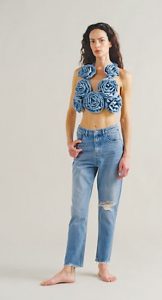
Created from spent yeast, protein-based fiber Procell offers properties similar to those of wool.
By Rachael S. Davis, Executive Editor
As the increase in alternative and sustainable materials for textile applications grows, so does the list of interesting raw material inputs.
Initially inspired by squid proteins and with funding from BioMADE, Philadelphia-based climate-positive smart textiles company Tandem Repeat Technologies Inc. has created Procell, a yarn that begins its life as low-cost spent yeast. This protein-based fiber mimics the properties offered by wool, with none of the ethical concerns relating to animal cruelty, water pollution and land degredation.
Squid ring teeth is a self-assembling protein complex found in squid tentacles. “We initially extracted the genes from squid and heterologously expressed then in yeast through precision fermentation,” explained Dr. Melik Demirel, co-founder of Tandem Repeat and Huck Endowed Chair Professor of Biomimetic Materials at The Pennsylvania State University. “However, we later found that biomass fermentation of yeast is more straightforward and cost-effective for producing commodity protein fibers.”
This protein biomanufacturing approach takes the living yeast cells and transforms them into valuable products — such as textile fibers or nonwovens — using a patented fermentation microbial process. Temperature, pH, nutrient availability and microbial strain selection is carefully controlled to maximize yields, titers and productivity to ensure the process is sustainable and economically viable.
According to Tandem Repeat, Procell’s greenhouse gas emission footprint of 5.39 kilograms (kg) of carbon dioxide per kg, water usage of 0.52 cubic meters per kg and land usage of 12.4 points per kg are lower than other natural fibers including cotton, lyocell and wool.

Processing Procell
Procell fibers are created using traditional wet spinning processes that are used in man-made cellulosic fiber production. From there, the staple fibers are spun into yarns, and Procell may be blended with other fiber types during spinning. “We have combined natural fibers like cotton and wool, as well as synthetics such as polyester to produce several garments,” Dr. Demirel noted. Initial apparel included a cotton blend dress and denim items, followed later by sweaters that can be purchased through the company’s own brand, Sonachic. “Procell can be crafted for various constructions, and we have developed both knitted and woven fabrics,” Dr. Demirel said. Procell has also been used to create nonwoven fabrics.
According to Tandem Repeat the fiber is soft and resembles a luxury wool such as cashmere. The 100-percent vegan, sustainable protein fiber is stronger than wool, but offers warmth, lightweight and breathability equal to or better than wool, and offers similar thermal conductivity. The company’s goal is to produce Procell at a cost lower than that of wool.
Dr. Demirel sees applications beyond textiles for Procell. “Our goal is to expand into other markets, including the leather, cosmetics, paper and pulp, and construction industries,” he said. “Protein fibers can serve effectively as feedstocks for all these sectors.”
Tandem’s research was supported by funding from BioMADE, an Emeryville, Calif.-based Manufacturing Innovation Institute sponsored by the U.S. Department of Defense, and member of the Manufacturing USA® network tasked with creating large-scale, public-private collaboration to advance manufacturing. “With support from BioMADE, we were able to reach a higher level of technological readiness in our industry where deep-tech advances thrive with government backing and venture capital funding remains limited,” Dr. Demirel noted.
For more information, e-mail contact@ tandemrepeat.com
2025 Quarterly Issue III




